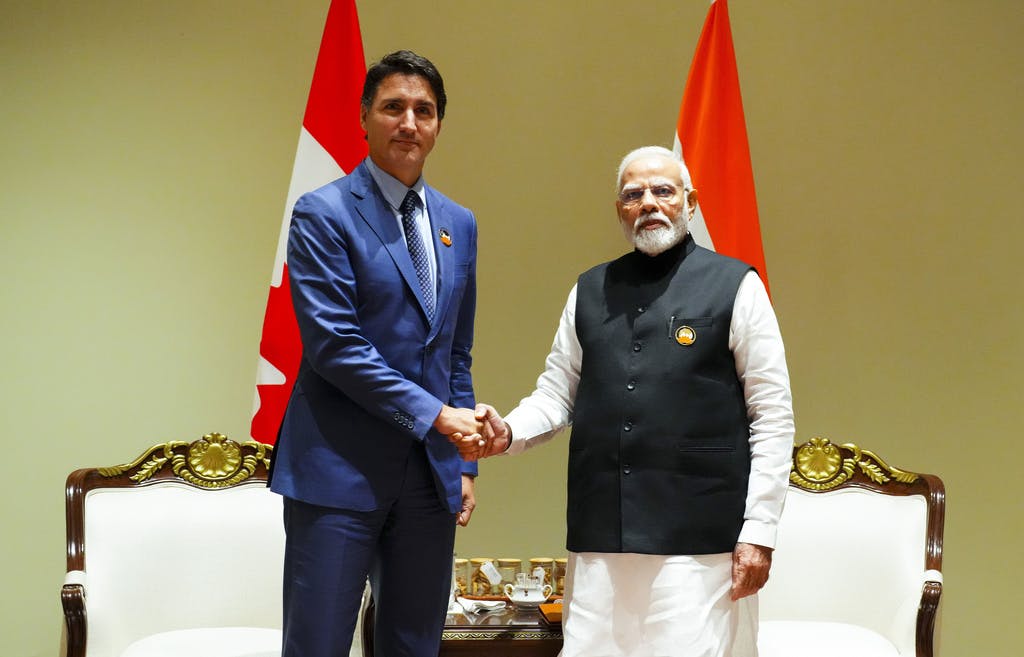Will America Side With India as India Feuds With Canada?
China will be the winner if diplomatic warfare persists between New Delhi and Ottawa, an Indo-Pacific watcher tells the Sun. India is the West’s most important ally on the Asian side of the new cold war.

As a rift deepens between Prime Minister Modi of India and his Canadian counterpart, Justin Trudeau, New Delhi is emerging as the top American ally, a relationship that is too important to fail.
India will no longer issue entry visas for Canadian tourists in the wake of threats to its diplomats in Canada, New Delhi announced Thursday. Earlier, Ottawa said it would reduce its diplomatic staff in India.
The diplomatic skirmish erupted after Mr. Trudeau said on Monday that Canada’s intelligence agencies are probing the possible involvement of Indian government agents in the June assassination of a Sikh separatist leader, Hardeep Singh Nijjar. The activist was shot dead by two masked men outside a Sikh temple in British Columbia.
As of yet, Washington has given no indication that Mr. Trudeau has shared with American counterparts any intelligence to support his allegation against India. Speculation is rife that the unresolved murder was part of internal battle among separatists.
An assaination of enemies on foreign soil “is not how India has operated in the past. It’s not part of their DNA,” a senior Western diplomat at New Delhi told the Sun, asking not to be identified. Nevertheless, he noted, India considers the Khalistan movement of Sikh separatists as an enemy of the state, and it believes that Ottawa is protecting it in Canada.
Tensions between the two countries burst into the open most recently during the mid-September G20 summit at New Delhi. Mr. Trudeau strangely refused to stay at a presidential suite provided by the host. After his plane suffered a malfunction, the Canadian also declined an offer to fly home on an Indian government aircraft.
While Mr. Trurdeu’s support is dwindling at home, Mr. Modi is widely predicted to win re-election next year. India, moreover, is emerging as America’s most valuable ally in efforts to block Beijing’s expansionism.
Along with Australia, Japan, and America, India is a member of the quad, an alliance that regularly conducts joint military exercises in the region, as deterrence to Chinese military maneuvers. Another grouping, the “five eyes,” includes America, New Zealand, Australia, Britain, and Canada. Delhi-Ottawa tensions threaten the cohesion of democratic alliances that Washington envisions as a bulwark to China.
So, which side wins if diplomatic warfare persists between India and Canada? “China,” an Indo-Pacific watcher at the Foundation for Defense of Democracies, Cleo Paskal, tells the Sun from her Montreal home.
A Canadian who often travels to India, Ms. Paskal says that regardless of the still-murky details surrounding the June assassination, Mr. Trudeau benefits politically from launching an attack on India.
Canadian protesters are angry over the premier’s gender policies. Leaders of the February anti-government trucker procession known as the “freedom convoy” are currently on trial on flimsy allegations of “mischief.” High inflation is eating up public support for the government.
Moreover, an allegation that Beijing operatives have interfered on Mr. Trudeau’s behalf in the 2021 election has made headlines in the Canadian press for months. Yet, now those headlines are being replaced by articles about his growing tiff with Mr. Modi.
“Forty-eight hours ago, Trudeau looked like an incompetent actor on the world stage who is damaging a relationship with a key democratic ally,” Ms. Paskal says. “Now he can paint himself as somebody who is standing up to a fascistic, terrorist-supporting, murderous state.”
In India, meanwhile, many believe that Mr. Trudeau’s allegations are tied to his long affinity with Communist China. Mr. Trudeau has no evidence whatsoever that India was involved in the Nijjar murder, a vice chairman at Manipal Academy, Mdhav Das Nalapat, tells the Sun. “The man is pandering to his friends in the People’s Republic of China by seeking to demonize India in the West,” he says.
In 1970, under Pierre Trudeau, the current premier’s father, Canada made inroads with Beijing even before President Nixon made his famous pilgrimage there. A famous photo of the elder Trudeau with his young son at Tiananmen Square, enjoying the government’s hospitality in 1989 during an infamous massacre, is making the rounds again.
Meanwhile, some Asia watchers caution that under Mr. Modi’s nationalist Bharatiya Janata Party, India is increasingly using aggressive tactics against perceived enemies. Yet, Sikh separatists were considered an enemy even before Mr. Modi took power.
In 1984, Sikh bodyguards killed Prime Minister Gandhi, a stalwart of the Congress Party that now opposes the BJP, after an anti-Khalistan military operation at Punjab. A year later, Sikh terrorists bombed Air India flight 182, killing 329 passengers.
Mr. Modi has all but ended the insurrection. Now he is angry that separatists continue to operate abroad, mostly in Canada. America has an interest in ending the feud, which means that we can expect the June murder to never be solved.
If the two leaders continue to go at each other, though, Washington would best ignore its northern neighbor, and instead back the country that is the West’s most important ally on the Asian side of the new cold war.
Correction: The “five eyes” group includes America, New Zealand, Australia, Britain, and Canada. An earlier edition misstated the group’s membership.

